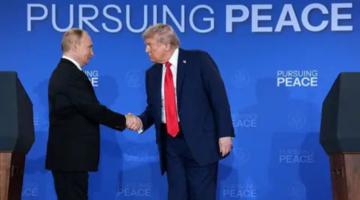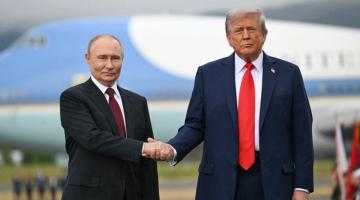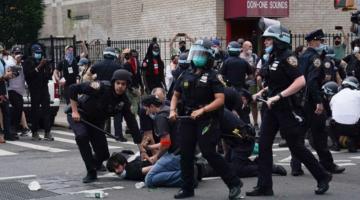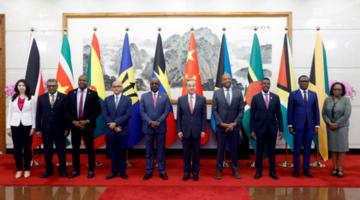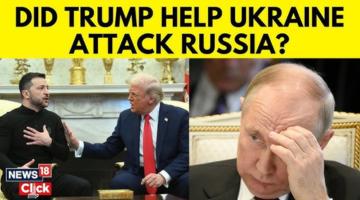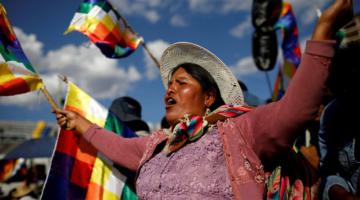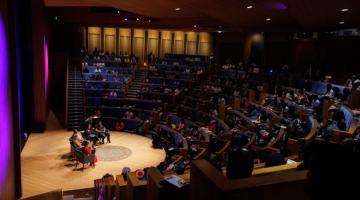Presidents Daniel Ortega of Nicaragua, Nicolas Maduro of Venezuela, Miguel Diaz-Canel of Cuba, and Luis Arce of Peru (Photo: Adalberto Roque / EFE)
The United States has turned Latin America and the Caribbean into a key battlefield in its new cold war on China and Russia, invoking the 200-year-old colonialist Monroe Doctrine to justify aggressive interventionist policies.
This article was originally published in Multipolarista.
The United States has turned Latin America and the Caribbean into a key battlefield in its new cold war on China and Russia.
Washington’s hybrid war on Beijing and Moscow took shape in 2018, when the Pentagon published a National Defense Strategy identifying the two Eurasian powers as the biggest “threats” to US national security.
Following the attacks on September 11, 2001, the US government had shaped its foreign policy around a so-called “war on terror.” But Defense Secretary James Mattis announced in January 2018 that the Pentagon had changed its priorities, and “great power competition, not terrorism, is now the primary focus of U.S. national security.”
The US director of national intelligence, Avril Haines, echoed this perspective in a Senate Intelligence Committee hearing this March. Summarizing the US intelligence community’s 2022 Annual Threat Assessment report, Haines said China and Russia constitute the top “threats” to Washington, and she emphasized that Beijing in particular “remains an unparalleled priority for the intelligence community.”
In this Cold War Two, Latin America has been caught in Washington’s crosshairs.
After Russia invaded Western ally Ukraine on February 24, the US military responded by threatening China and Venezuela.
On February 26, the US Navy sent a guided-missile destroyer warship through the narrow Taiwan Strait, in a move that the Chinese government condemned as an “adventurist” and “provocative action” seeking “to bolster the ‘Taiwan independence’ forces.”
Then on February 27 and 28, the US Navy held anti-submarine warfare exercises with the Colombian military, using a nuclear submarine for the first time ever. Making it clear that this was a threat aimed at Beijing’s leftist ally in Caracas, the exercises were held in the Caribbean Sea, near the border of Venezuela. Colombia is the first and only special “partner” that the US-led NATO military alliance has in Latin America.
Washington’s economic warfare on Moscow has also targeted Latin America.
US President Joe Biden’s special assistant for Latin America, Juan S. González, revealed in an interview on February 25 that the devastating new sanctions imposed on Russia over its intervention in Ukraine also seek to hurt the economies of Venezuela, Nicaragua, and Cuba.
González, who serves as the US National Security Council’s senior director for the Western Hemisphere, stated clearly, “The sanctions against Russia are so robust that they will have an impact on those governments that have economic affiliations with Russia, and that is by design. So Venezuela is going to start feeling that pressure. Nicaragua is going to feel that pressure, along with Cuba.”
These three Latin American nations with socialist governments were demonized as the so-called “Troika of Tyranny” by John Bolton, the Iraq War architect and neoconservative national security advisor for former president Donald Trump.
US officials bring back the 200-year-old colonialist Monroe Doctrine
The fact that Latin America is on the frontlines of Washington’s new cold war is also reflected in US officials’ increasing references to the Monroe Doctrine, an 1823 declaration that the United States considers the region to essentially be its colonial backyard.
Bolton invoked this two-century-old colonialist doctrine to justify Washington’s numerous coup attempts against Venezuela’s democratically elected socialist government.
Trump himself also cited the Monroe Doctrine in his speech at the United Nations General Assembly in 2018.
“It has been the formal policy of our country since President Monroe that we reject the interference of foreign nations in this hemisphere,” Trump stated on the world stage. The US president was referencing Latin America’s bilateral relations with China and Russia, which he portrayed as “threats.”
Trump’s secretary of state, Rex Tillerson, the former CEO of US oil giant ExxonMobil, likewise praised the Monroe Doctrine, while ironically claiming China is the one with “imperial” ambitions in the region.
When Argentina’s center-left President Alberto Fernández took a historic trip to China and Russia this February, to try to find ways around the $44.5 billion in odious debt that his country has been trapped in by the US-controlled International Monetary Fund (IMF), the hawks in Washington were furious.
Republican Congressman Matt Gaetz, a key Trump ally representing northern Florida, characterized Fernández’s trip as a sign of a “significant threat to our nation accelerating rapidly close to home,” fuming that “Argentina, a critical nation and economy in the Americas, has just lashed itself to the Chinese Communist Party, by signing on to the One Belt One Road Initiative.”
On the floor of the House of Representatives on February 7, Gaetz angrily described Argentina’s new partnership with China as “a direct challenge to the Monroe Doctrine.”
Yet this colonialist rhetoric is by no means limited to Republicans. The Democratic president has made similar comments.
At a press conference on January 19, Biden referred to Latin America as the US “front yard,” stating, “We used to talk about, when I was a kid in college, about ‘America’s backyard.’ It’s not America’s backyard. Everything south of the Mexican border is America’s front yard.”
For his part, Biden has continued most of Trump’s policies in Latin America, expanding illegal US sanctions on Cuba, Nicaragua, and Venezuela, while still recognizing unelected coup leader Juan Guaidó as supposed “president” (even as the Biden administration pressures Caracas to make up for sanctioned Russian oil).
Washington has strong-armed governments in Latin America and the Caribbean, pushing them to reduce or even cut off their ties with China and Russia.
While China has become the largest trading partner for many countries in the region, the United States has resorted to blackmail to desperately try to stop the expansion of Huawei 5G networks, even when nations don’t have suitable technological alternatives.
Right-wing opposition leaders in Venezuela, Nicaragua, and Bolivia have joined Washington in demonizing Beijing, while vilifying Moscow too, demanding that their governments cut ties with the Eurasian powers and instead strengthen relations with (or rather subordinate themselves to) the United States.
Washington pressures nations in Latin America and the Caribbean to keep recognizing Taiwan
In its Second Cold War, the United States sees Latin America and the Caribbean as especially strategic because it is one of the few regions of the world where countries still recognize the independence of Taiwan.
Taiwan is part of the People’s Republic of China, and 93% of UN member states recognize this fact – including the United States, at least on paper, although not in practice.
Yet 13 countries (plus the Vatican) consider Taiwan to be an independent state. All 13 are small, making up just 0.2% of global gross domestic product, but eight of them are in Latin America and the Caribbean.
Belize, Guatemala, Haiti, Honduras, Paraguay, Saint Kitts and Nevis, Saint Lucia, and Saint Vincent and the Grenadines still have formal diplomatic relations with Taiwan.
US and Taiwanese authorities have used the carrot (favorable economic deals) and the stick (blackmail) to prevent these countries from normalizing relations with the People’s Republic of China.
The US government supports secessionists in Taiwan, and has sent military personnel there to train them to eventually fight a war with mainland China. The number of US troops in Taiwan has doubled under Biden.
Washington’s goal is to turn Taiwan into a neo-colonial outpost, hoping to build a large US military base there with nuclear weapons aimed at the mainland, as it had from the 1950s to the 1970s, at the height of the First Cold War.
Latin America strengthens its alliance with China and Russia
Despite Washington’s intense pressure campaign, many parts of Latin America are deepening their integration with China and Russia – just as Beijing and Moscow are bolstering their own strategic partnership.
Cuba officially incorporated into China’s massive global infrastructure project, the Belt and Road Initiative, this December. Nicaragua then followed suit in January. Venezuela had already joined years before.
The right-wing US-backed regimes that governed Nicaragua in the neoliberal era, from 1990 to 2006, had cut ties with the People’s Republic of China and formed a close alliance with Taiwan.
Nicaragua’s Sandinista government reversed this policy, re-establishing relations with Beijing this December, then promptly signing a series of important agreements for Chinese help in building public housing and infrastructure, including hospitals, renewable energy, roads, railways, and ports, as well as water and public health systems.
In addition to being part of the anti-imperialist Bolivarian Alliance (ALBA), Venezuela, Nicaragua, Cuba, and Bolivia have joined China and Russia as key members of the Group of Friends in Defense of the Charter of the United Nations, a diplomatic alliance aimed at challenging imperialist hegemony and unipolarity.
This Group of Friends reflects a new political pole that is being developed to push back against the aggression of the US-EU-NATO imperialist bloc. This new cold war alignment was clearly reflected in the March 2 UN General Assembly vote on Russia’s military incursion in Ukraine.
The countries in Latin America with socialist and anti-imperialist governments – Cuba, Venezuela, Nicaragua, and Bolivia – either abstained or did not vote for the resolution condemning Russia.
Other nations with socialist governments – China, Vietnam, Lao, and the DPRK – or which waged successful anti-colonialist revolutionary struggles – such as Iran, Eritrea, Algeria, South Africa, Angola, Syria, Zimbabwe, and Mozambique – likewise abstained or voted against the anti-Russian resolution, while the Western imperialist powers and their allies and proxies voted for it.
These are the fault lines of the new cold war.
Benjamin Norton is a journalist, writer, and filmmaker. He is the founder and editor of Multipolarista, and is based in Latin America.

